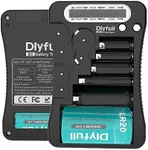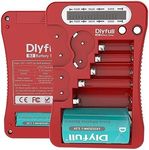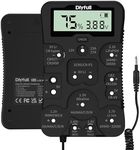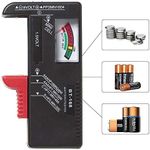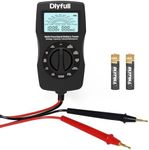Buying Guide for the Best Household Battery Tester
When choosing a household battery tester, it's important to consider the specific needs you have for testing batteries. A battery tester is a handy tool that helps you determine the remaining charge in your batteries, ensuring that you don't throw away batteries that still have life left in them or use batteries that are too weak for your devices. Understanding the key specifications will help you select a tester that is both effective and easy to use for your particular situation.CompatibilityCompatibility refers to the types of batteries that the tester can evaluate. This is important because different devices use different types of batteries, such as AA, AAA, C, D, 9V, and button cells. Some testers are versatile and can handle multiple types, while others are limited to specific ones. To choose the right tester, consider the types of batteries you most frequently use in your household. If you have a variety of devices, a multi-type tester would be beneficial. However, if you primarily use one type, a specialized tester might suffice.
Display TypeThe display type on a battery tester shows the results of the test. This can range from simple LED indicators to more detailed LCD screens. A clear and easy-to-read display is crucial for quickly understanding the battery's status. LED indicators are straightforward, often showing a simple pass/fail or low/medium/high status. LCD screens can provide more detailed information, such as the exact voltage. If you prefer quick and simple results, an LED display might be enough. For those who want more detailed information, an LCD display would be more suitable.
Ease of UseEase of use refers to how simple it is to operate the battery tester. This is important because a complicated tester can be frustrating and time-consuming. Look for testers with straightforward instructions and intuitive designs. Some testers require you to manually adjust settings for different battery types, while others automatically detect the type and adjust accordingly. If you want a hassle-free experience, opt for a tester with automatic detection and minimal setup requirements.
PortabilityPortability is about how easy it is to carry and store the battery tester. This is important if you need to test batteries in different locations or if you have limited storage space. Smaller, lightweight testers are easier to carry around and store. Consider how often you will need to move the tester and where you will store it. If you need to test batteries on the go or have limited space, a compact and portable tester would be ideal.
AccuracyAccuracy refers to how precisely the tester can measure the remaining charge in a battery. This is crucial for ensuring that you get reliable information about your battery's status. More accurate testers provide a better assessment of battery life, which can help you make informed decisions about replacing or recharging batteries. If you need precise measurements, look for testers with a reputation for high accuracy. For general household use, a tester with good accuracy that provides a clear indication of battery health is usually sufficient.

